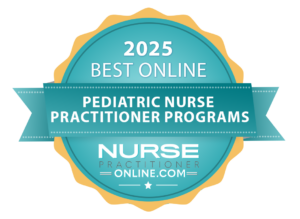Best Online Pediatric Nurse Practitioner (PNP) Programs
Compare the 2025 Top Ranked Online PNP Programs
Providing medical care to children is a calling for many nurses. For those looking into advanced practice nursing roles, the Pediatric Nurse Practitioner (PNP) is a special role. Finding the right program to complete a PNP degree at the MSN, post-master's certificate, or DNP level is of utmost importance. With the emergence of online programs, the academic field is even more saturated with possibilities. This is why we've ranked the top online Pediatric Nurse Practitioner programs across the country. Browse the top schools below, and find out more about our rankings methodology.

Mobile, AL
 Overview:
Overview:The University of South Alabama, located in Mobile, offers both a Pediatric Acute Care Nurse Practitioner MSN as well as a Pediatric Primary Care Nurse Practitioner MSN. These online programs prepare students for advanced practice or for future DNP studies.
- Hospital-affiliated school
- Mandatory Clinical Skills Intensive required
- Both tracks require a total of 45 credit hours
Augusta, GA
 Overview:
Overview:Augusta University's Pediatric Nurse Practitioner (PNP) program offers advanced education for nurses seeking to specialize in pediatric care. With a focus on evidence-based practice and clinical expertise, this program prepares nurses to provide high-quality healthcare to children and adolescents in diverse healthcare settings.
- DNP- Pediatric NP Online
Philadelphia, PA
 Overview:
Overview:Drexel University's College of Nursing and Health Professions offers a top-ranked pediatric nurse practitioner program, preparing students to provide comprehensive healthcare to children and adolescents. The program combines advanced clinical training with a focus on evidence-based practice and cultural sensitivity. Drexel's nursing department, known as the "Cradle of Global Nursing," is dedicated to promoting health equity and social justice through nursing education, research, and practice.
What Is an Online Pediatric Nurse Practitioner Program Like?
For nurses who are passionate about providing health care to little ones, enrolling in an online pediatric nurse practitioner program can be a great way to further your nursing career and work with the patient population that you love. Choosing an online pediatric nurse practitioner program can be a great fit if you want to continue excelling in your job while also moving forward with your education. When you choose an online NP program, you get to work at a pace that makes sense for you, on your own time. Faculty members understand the demands of your job and will work hard to help you make your education happen while continuing to provide top-notch patient care.
Choosing an Appropriate Pediatric Nurse Practitioner Program
The right pediatric nurse practitioner program for you will first depend on the level of nursing education you currently hold. Check out the table below to see what your options are for the degree level you will be going into the program with.
| If I Currently Have… | Option 1 | Option 2 |
|---|---|---|
| BSN | BSN to MSN Programs | BSN to DNP Programs |
| MSN | Post-Master’s Certificate | MSN to DNP Programs |
To see programs at each degree level, click the buttons below:
Your long-term career goals will also impact which pediatric nurse practitioner degree type is right for you. Think in terms of the job title, type of care delivery, and environment you aspire to work in. While it’s true that you can always go back for more education, determining your professional goals will save you the stress and hassle of having to go back to school later – which can also save you money.
To get a better sense of your goals, consult the table below to see what pediatric nurse practitioner degree types align with your passions.
| MSN | Post-Master's Certificate | DNP | |
|---|---|---|---|
| I enjoy working directly with pediatric patients | X | X | X |
| I already hold a graduate degree, but I wish to move into specialized pediatric practice | X | X | |
| I feel called to teach at the university level | X | X | |
| I want to advocate for children and nurses and be a leader in my facility | X | X | X |
| I have ideas for clinically relevant research projects to improve the lives of children | X | ||
| My passion is to create and improve national health policies | X | ||
| I wish to understand population-based pediatric health in order to improve healthcare outcomes for children across the nation | X | ||
| I want to guide healthcare law and ethics for the benefit of children | X |
- Online Pediatric Nurse Practitioner Program Admissions & Requirements by Degree Type
- Online Pediatric NP Program Classes and Curriculum
- Clinical Requirements and Certification
Online Pediatric NP Program Admissions
When applying for an online pediatric NP program, you’ll want to carefully go over the admissions criteria. It’s a good idea to apply to a few different programs (and your employer may even cover your application fees). Online pediatric NP programs fall into three categories: MSN, post-master’s certificate, and DNP.
| MSN-Level Pediatric NP | Post-Master’s Certificate Pediatric NP | DNP-Level Pediatric NP | |
|---|---|---|---|
| Prior Education/GPA | BSN with a GPA of at least 3.0 | MSN with a GPA of at least 3.0 | MSN with a GPA of at least 3.0, some DNP programs may allow you to do a BSN-DNP track with a GPA of at least 3.0 |
| RN Licensure | Current, unencumbered RN license | Current, unencumbered RN license | Current, unencumbered RN license, may also require APRN certification in pediatrics or related field. Experience in the field may be acceptable. |
| Professional Experience | One year of work as an RN | One year of work as an RN; may also require one year of experience working in pediatrics or related field | One to two years of work as an RN; may also require up to two years of experience working in pediatrics or related field |
| Written Requirements | Personal statement, three letters of recommendation | Personal statement, three letters of recommendation | Personal statement, three letters of recommendation |
Online Pediatric NP Curriculum & Classes
Each program (MSN, post-master’s certificate, and DNP) will differ on the length of time needed to complete them. The MSN will take around 2 years, the post-grad cert can usually be completed in a few semesters, and the doctoral DNP program can take 3 more years of full-time study. Pediatric specialty MSN, post-master’s certificate, and DNP programs differ in both the number of course credits and the number of clinical hours required.
Both MSN to DNP and BSN to DNP programs are available. BSN to DNP programs typically wrap the MSN content into the program. Many students choose to go through their studies part-time, allowing them to remain dedicated to patient care while also earning their graduate degree or certificate. Most schools allow up to six years for nurses to complete the DNP program, and may also allow this amount of time to complete the MSN program or the post-master’s certificate. As you complete your online pediatric nurse practitioner curriculum, some of the classes you’ll likely be required to take include:
- Nursing research
- Advanced pharmacotherapeutics
- Advanced pathophysiology for neonatal & pediatric health
- Evidence-based practice
- Primary healthcare of children: chronic illness & disabilities
- Health systems, policy & social justice
Pediatric NP post-grad certificate and MSN programs provide similar content, with the post-grad certificate requiring less core coursework. Both the MSN and DNP pathways will require students to take some leadership, and policy coursework. DNP students also typically take coursework in ethics, biostatistics, and more. The DNP route will also typically include a capstone course or final project. This scholarly project is a way for the student to demonstrate what they’ve learned in the program, and aims to address a clinical question as it relates to pediatric care.
Pediatric NP Clinical Requirements
Most clinical programs require that you complete at least 600 clinical hours. Many programs, particularly the DNP, require more; over 1,000 may ultimately be required. Your program will likely be willing to work with you to help you find a way to meet your requirements that makes sense for your schedule. This may mean getting some of your clinical hours at your regular job, working at more than one setting, or working with an in-home health agency to get the experience that you need. You can also complete clinical hours at youth rehabilitation centers, private healthcare facilities, and more. If you’re struggling to find a way to complete your clinical hours that makes sense for you, be sure to reach out to your program advisor. They understand how difficult it can be to balance your education and your busy schedule, and they’ll help you find ways to get the clinical experience that you need to be successful in your program.
